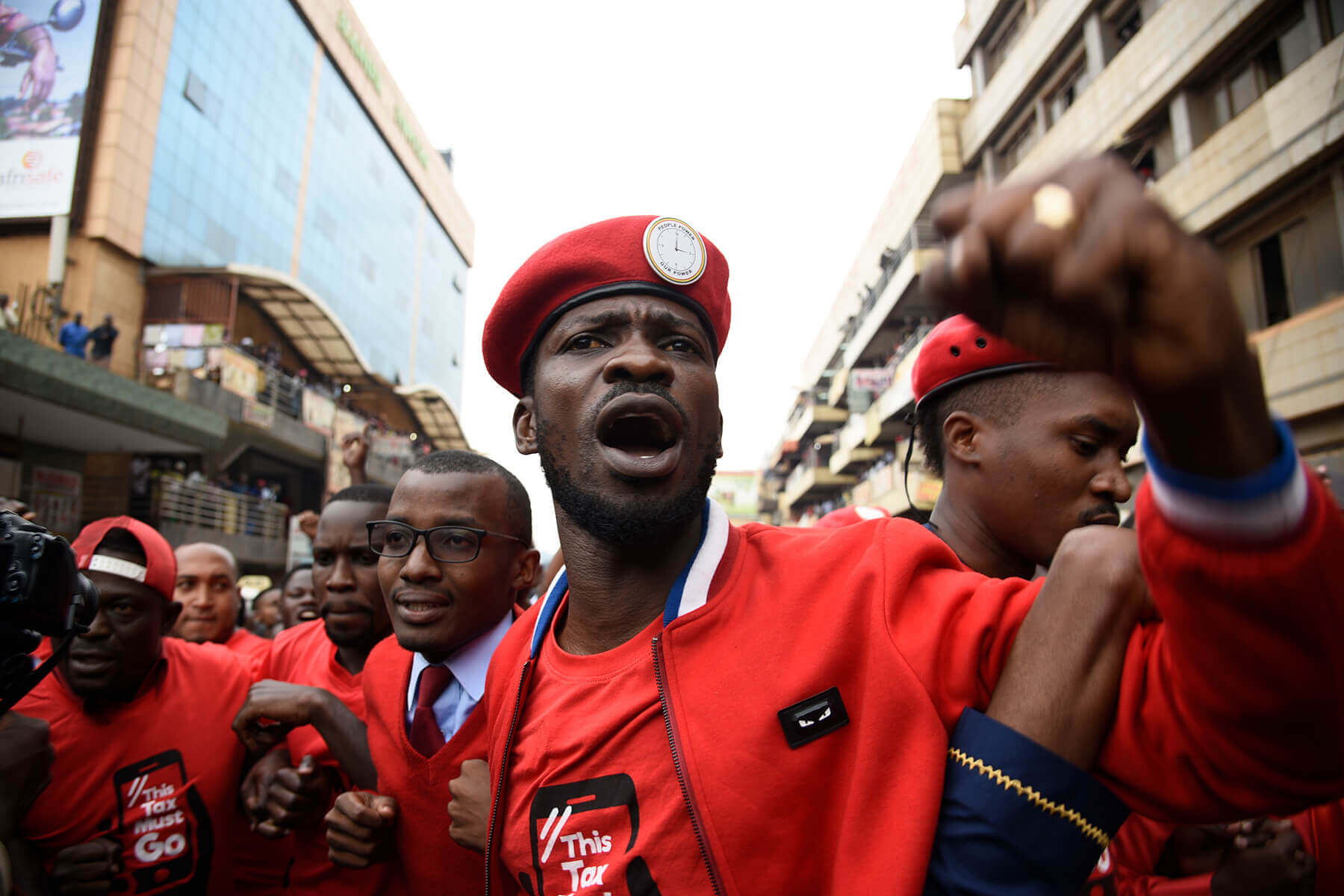In yet another indictment of the legitimacy of Uganda’s upcoming presidential election in January, opposition candidate Bobi Wine briefly suspended his electoral campaign over fears for his life, after being attacked by security forces once more on Tuesday.
Wine, whose real name is Robert Kyagulanyi, has already been arrested multiple times, including twice this month. In early November, opposition presidential candidate Bobi Wine was arrested just after receiving his certification as a candidate for the election. After briefly being detained, he was released, but was then arrested again later in the month on November 18.
The latest flagrant attack on the supposedly democratic principles of the country was in full view on Tuesday, when military officers—who are generally perceived to be loyal to President Yoweri Museveni’s administration—shot rubber bullets at Wine and his security personnel to prevent them from attending a rally. One individual from Wine’s security detail was taken to the hospital. The National Unity Platform (NUP)’s spokesperson, Joel Senyonyi, said that Wine, too, “lost some teeth and his mouth is torn”.
At the time, Wine was not willing to risk putting himself or his entourage in further danger, particularly in light of the fact that a similar incident in 2018 left his former driver dead and forced Wine to seek medical treatment in the United States (US).
Bobi Wine stepped out of the car to question military officers why they were shooting at him and his team. This was their response!
— BOBI WINE (@HEBobiwine) December 1, 2020
- Admin pic.twitter.com/7w5twNCyvp
Following this latest attack, Wine arranged a news conference to announce: “With effect from today, I am suspending my campaign until further notice.” He added, “We are going to the electoral commission headquarters to inquire why we are being tortured by security institutions… our campaign is affected by police brutality.”
He later took to social media to write: “The police and military have attacked us yet again, shot and injured many of my team members and other Ugandans who gathered to wave to me in Kayunga. My friend and producer Dan Magic has been hit in the face! ASP Kato, a police officer attached to me has also been badly injured. Many comrades are gravely injured. Pray for us. Pray for Uganda. We shall overcome!" he said in a statement posted on his social media platforms.”
The Electoral Commission’s (EC) spokesperson, Paul Bukenya, responded to Wine’s suspension of his campaign by saying: “Mr Kyagulanyi is a registered candidate and he is free to come and express himself on any issues as long as he is not comfortable. It is unfortunate that the police are acting this way but our means have always been on engaging the stakeholders.”
Wine, for his part, is not hopeful of productive dialogue with the EC, believing that the body simply does the bidding of Museveni. He further claims that, despite the government’s official tally of 54, there were over 100 people killed last month during protests that also saw 800 arrests. However, since meeting with EC chief Simon Byabakama, Wine has resumed his campaign, saying, “We came here to tell the electoral commission to take charge of the electoral process or resign if they cannot stop police brutality.”
Alongside this suppression of political opposition and activists, the Ugandan government has now begun deporting foreign journalists as well, in what critics say is an effort to shield Museveni’s administration from international criticism and obscure the harsh ground reality in the country. Three journalists— Margaret Evans, Lily Martin, and Jean-Francois Bisson—were arrested by immigration officers last week and held in detention for ten hours and then deported, despite possessing ‘official media credentials’.
Domestic journalists are frequently arrested and intimidated as well. In fact, in September the ruling government increased the roadblocks for content-sharing and news platforms to publish information. Bloggers, online television and radio channels, online newspapers, and broadcasters must now obtain special authorization and permits from the Uganda Communications Commission (UCC) before October 5 to continue operations. It is thus no coincidence that Uganda ranks 125th out of 180 countries in the world press freedom index.
The president is renowned for suppressing political dissent and opposition, and has overseen Uganda’s slow descent into a failed state. The judiciary essentially acts as an arm of his rule and the police do his bidding on the streets to clamp down on uprisings and protests.
Wine is seeking to unseat President Museveni, who has been in power since 1986. The incumbent leader amended laws to do away with the two-term limit in 2005, after not holding any elections for the first ten years of his rule. Then, in 2017, he removed the age limit for presidential candidates to allow him to seek re-election as the National Resistance Movement’s (NRM) candidate once more.
While the resumption of Wine’s campaign just one day after its suspension is sure to draw some criticism from the ruling government and its supporters for being a political gimmick, the nature and validity of his complaints about police brutality and government overreach still hold true. Therefore, Wine’s decision to briefly suspend his electoral campaign is sure to invite further criticism and undermine the legitimacy of Museveni’s rule and the credibility of the upcoming elections.

